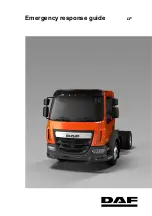
DAVINO 120TW - USER AND MAINTENANCE MANUAL Rev.04
- Pag. 29
FLUIDS HOT AND UNDER PRESSURE
The hydraulic system is under pressure when the engine is running and can maintain the pressure even
after it is switched off.
Hot hydraulic oil causes severe burns.
Wait for the oil to cool down before disconnecting the pipes. Pressure fluid leaks can be invisible.
Do not use hands to check for leaks. Leaking a fluid from a hole too small can have enough force to
penetrate through the skin.
When looking for any leaks, use a cardboard or a piece of wood.
Wear gloves to protect your hands from any spashes of oil. Do not attempt to repair or tighten hoses or
hydraulic connections when the hydraulic system of the vehicle is under pressure.
Stop the engine, remove the load from all the cylinders and vent the pressure.
Keep your face and hands away from loose fittings whenever the hydraulic system is being tested.
Use protective goggles, hydraulic oil spray under pressure can penetrate the skin and cause permanente
eye damage.
If liquid or oil leakage is detected, stop the machine immediately and make the necessary repairs.
Turn off the engine and make sure all hydraulic controls are in the NEUTRAL position before removing
covers, fittings, pipes, plugs, etc.
BURNING WATER
To prevent burns caused by hot water or vapor escaping during refrigerant control or discharge, wait for
the water to cool down to a temperature at which it ispossible to touche the radiator cap with your hand
before starting any operations. Even when the coolant has cooled down, before removing the cap, loosen
it gradually to lower the pressure inside the radiator.
To prevent burns when checking or unloading the oil, wait for the oil to cool down to a temperature at which
it is possible to touch the cap with the hand before starting any operations.
Even when the oil has cooled down, before removing the cap, loosen it slightly to lower the internal
pressure.
Do not touch the muffler immediately after turning off the engine : a very hot muffler can cause serious
injury.
VENTILATION
Do not operate the machine in closed environments except in those equipped with a suitable intake and
exhaust system for combustion gases.
Good ventilation is very important for operating the machine. Exhalations of carbon monoxide coming from
the engine exhaust can also cause choking in closed areas.
INTOXICATION
The combustion fumes produced by the machine engine, if inhaled directly and continuously, can be very
dangerous and/or lethal to the body.
If enclosed work is to be carried out, use all possible means to facilitate fresh air recirculation and protect
the respiratory tract using a suitable mask.
Pay attention to inhalation or contact with battery acids that are extremely toxic and cause serious burns.
Use gloves and protective goggles (when necessary).
FIRE PREVENTION
Fire caused by fuel or oil
Fuel and oil are inflammable liquids and are dangerous. Always observe the following precautinos to
prevent any fires.
Do not refuel the fuel tank with the engine in motion, in the presence of fuming materials and free flames;
do no use matches, lighters or torches to illuminate the refueling area.



































